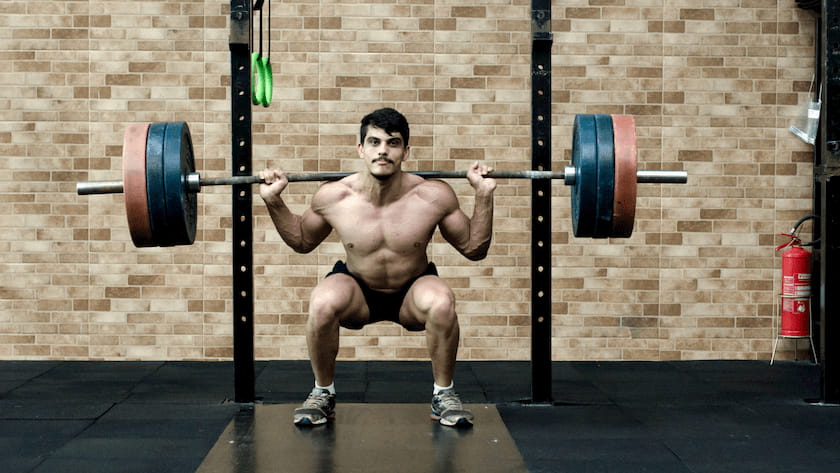9 Quick Tips Guaranteed to Increase Your Squat
1. Work on your form and perfect it
Just like any compound movement, proper form is critical in order to get results and avoid injury. You have two options when setting up for the squat: You can choose the high bar or low bar position.
High Bar
- Placed on the upper traps
- Torso remains upright
Low Bar
- Placed on the rear deltoids
- Slight bend at the hips
- Hip-dominant
Experiment and decide which works best for you (remember to switch it up so that you don’t become dependent upon one form only), then prepare yourself to unrack the weight.
How to Unrack the Weight
- Feet should be directly under the bar
- Chest is up
- Unrack (don’t unrack the weight passively)
- Step backward (one step on each foot)
- Get in your stance
- Tighten core
- Head in a neutral position
How to Descend
- Push hips back WHILE bending the knees
- Should feel as if you’re sitting back into a chair
- Ensure the knees stay in line with your toes, try not to let your knees come out over your toes
- Hit depth (parallel at least, ideally get the hip just below the knee)
- Explode to the top
2. Squat heavy
For beginners, stick with a basic strength template: 5 sets with a 3 to 6 rep range using 70% to 90% of your 1RM.
For more advanced lifters, try out the following program. This program will surely add poundage to your one rep max and beef up your legs in the process!
Week 1
- 5 sets of 2-3 repetitions at 90% of 1RM
- 2 sets of 4-6 (80-85% of 1 RM)
- 1 set of 12-15 (55-70% of 1RM)
Week 2
- 6 sets of 2-3 reps (90% of 1RM)
- 3 sets of 4-6 reps (80-85% of 1 RM)
- 1 set of 12-15 reps (55-70% of 1RM)
Week 3
- 6 sets of 2-3 reps (90% of 1RM)
- 4 sets of 4-6 reps (80-85% of 1 RM)
- 1 set of 12-15 reps (55-70% of 1RM)
Week 4
- 5 sets of 2-3 reps (90% of 1RM)
- 5 sets of 4-6 reps (80-85% of 1 RM)
- 2 set of 12-15 reps (55-70% of 1RM)
Week 5
- 1 set of 1 rep (1 Rep Max)
3. Squat deep
No, you can’t squat half depth. Yes, you may have to lower the weight. You need to go to at least parallel if you want solid results. Squatting deep will:
- Build size and strength
- Get the glutes firing
- Strengthens your lower back
- Increases power and athleticism
4. Get flexible
To perfect your form, there is no way around making yourself more flexible. Flexibility helps you take full advantage of the deep squat. Make stretching and flexibility exercise a part of your routine, especially when it comes to your hips.
Over time, you will notice that you are able to squat lower until you break the parallel plane. Practice your form and depth at home with bodyweight squats, since practice makes perfect.
5. Get the right footwear
There is a reason that companies spend thousands of dollars on research to craft the perfect shoe: they want you to be able to maximize your exercise potential.
Wearing the wrong shoes during a heavy squat session will not only unnecessarily increase the difficulty but also place you at risk for injury. Look for a shoe specifically made for Olympic lifting or powerlifting.
6. Pause squats work
If you really want to see results, try incorporating pause squats in your squat routine. Perform a squat as you normally would but instead of immediately ascending, stop at the bottom of the movement.
Hold yourself there for 3 to 5 seconds then stand up. Do this for every single rep. You’ll immediately feel the difference in your glutes, hamstrings, and hips. Try doing your heavy sets and finish off with high bar pause squats!
7. Gorilla mindset
Get pumped, get hungry, and get aggressive. It’s all about mind over matter. If you enter the gym with little motivation, it’ll show in your results.
Real science, such as this one from researchers at AUT University, have shown that mental preparedness leads to results. In that particular study, athletes were able to increase peak performance by an average of 8% simply by getting psyched about the lift. Put simply: use music, yell loudly, or focus on a specific image. Do whatever it takes to get yourself in the zone, then dominate the squat rack.
8. Squat hard, squat often
This may seem a bit too obvious, but in order to get better with your squat, you have to make it a part of your life. Many Olympic lifters, for instance, squat every single day during their training, sometimes twice per day.
If you want to see improvements in your strength and power, then you need to incorporate squat variations into your routine at least 2 to 3 times per week.
9. Try a new stance
As briefly mentioned above, for many of us, we’ve found a comfortable squatting position, and we haven’t budged from it. Sticking to the same stance and form is like a double-edged sword.
While you may see some terrific gains, you are not maximizing your overall squatting potential. Make sure you switch up your stance by utilizing the wide stance (feet past shoulder width) and the close stance (feet at or closer than shoulder width).




Leave a comment
All comments are moderated before being published.
This site is protected by hCaptcha and the hCaptcha Privacy Policy and Terms of Service apply.